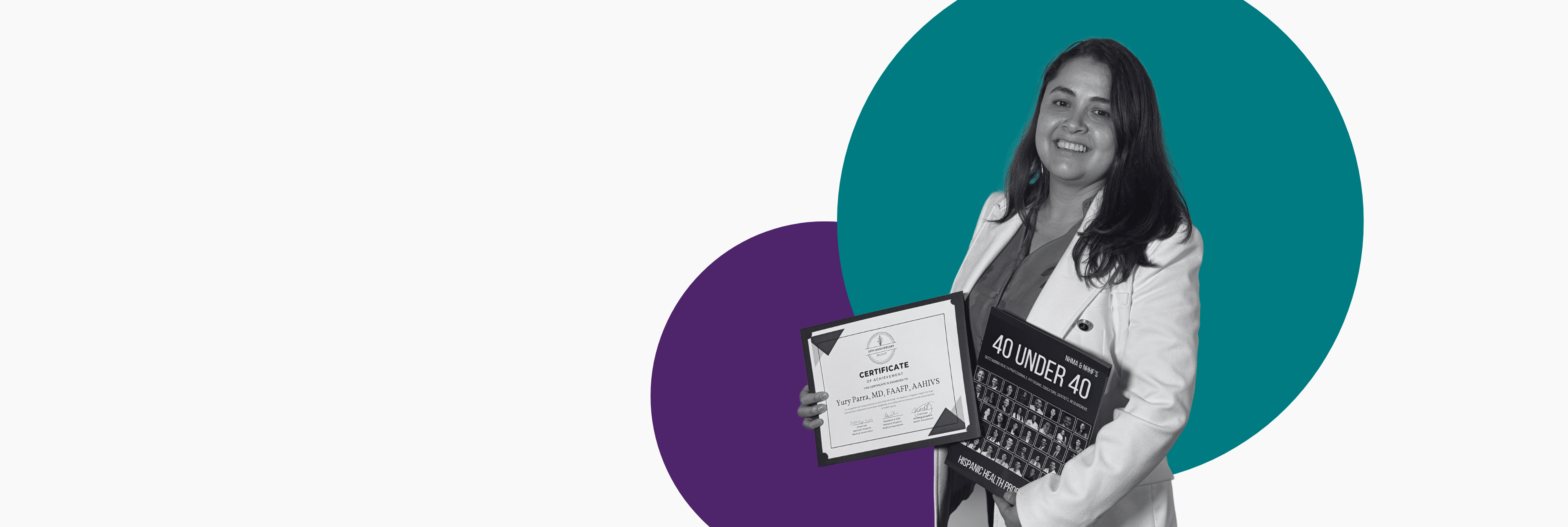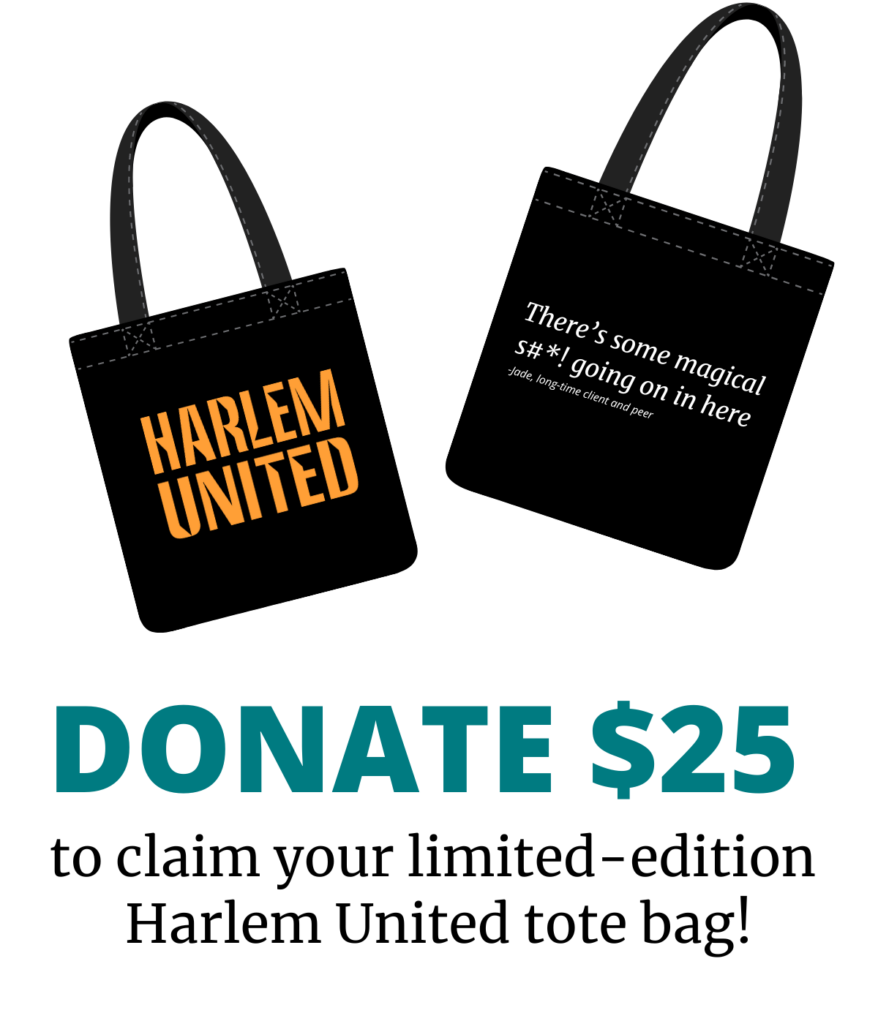Dr. Yury Parra, Harlem United’s Medical Director, was recognized with the “40 Under 40 Outstanding Health Professionals” distinction award by the National Hispanic Medical Association (NHMA) and the National Hispanic Health Foundation (NHHF).
We sat down with Dr. Parra for a Q&A about the award, her work, and her vision for community healthcare.
Why do you do this work?
I myself was a patient at a community health center like Harlem United’s. As newly arrived immigrants to the U.S., my family navigated healthcare through Federally Qualified Health Centers. I was the first in my family to go to college, and then I followed a medical career.
But as a patient of community health centers in New York, I didn’t just want to be a clinician, but a clinician who plays a role in advocacy and community. I enjoy medicine, I enjoy the one-on-one with patients, but I also believe in addressing the social injustices impacting our communities.
But beyond my own personal experience, I think I found my way to serve through healthcare. I believe that communities that have been historically disenfranchised and underserved deserve high quality care. That is truly what drives my work: we are capable of delivering high quality, competent, compassionate care to individuals who have complex psychosocial factors affecting their health.
What does it mean to you to be recognized with the 40 under 40 distinction award by NHMA and NHHF?
This award was so validating, but not just for me. It was a recognition for my mom. It was a recognition for generations of women in my family. So much strength, sacrifice and healing went into making this possible.
My mom was the first in my family to go to high school. And I was the first to go to college and then medical school. This award is a beautiful reminder of what’s possible.
I sent my family a lot of pictures from the award ceremony and then my mom sent them to everyone! People she grew up with in the little town in Colombia know about it!
If I could talk to my 20-year-old self, I would say “yes, it has been hard. Yes, your journey will continue to be hard. But it will take you to a place where you can follow your passion.”
This award belongs to the many, many people who have supported me through this journey. Family, friends, mentors, and the patients who honor me with their trust and remind me why I do this work.
What do you prioritize when you are working with a patient?
I like to start my visits by asking the patient, “there’s so many things that we can cover today, but what are your top two priorities?” It only takes a couple minutes to really listen to a patient. When I ask for their priorities, patients know I’m seeing them as a whole human being, not just health problems to enter into a computer and move on.
I want to understand their perspective – if I understand their framework, the likelihood of developing a partnership is higher. The likelihood of the patient accepting a recommendation that I give for a vaccine or a medication is higher if I really understand their priorities.
For example, if a patient has diabetes, I might have all these important goals for their health like getting their eyes and feet checked, but if they don’t have access to healthy food, none of my goals matter.
Can you give me an example of cultural competence in action?
We have a significant number of patients in the clinic who were celebrating Ramadan recently. And I would say my understanding of how Ramadan is practiced was very narrow.
I had a patient who was very worried about getting blood work drawn during Ramadan. He was living a shelter for newly arrived immigrants, and he was experiencing food insecurity. So, in addition to fasting during the day, he had not had a heavy meal to start the morning. In conversation with him, I recognized my own limitations in understanding.
So, I sought support and mentorship from a colleague, who explained to me that in certain parts of the world getting blood drawn during Ramadan is ok. In other parts of the world, it is not. I also took into account the medical necessity. In this case, the blood work was not urgently necessary. I didn’t need to push my agenda to get the bloodwork done on the patient.
After that, I was able to have a more informed conversation with the patient. And together we were able to decide what to do. He decided to have the blood drawn and he returned a few days later to hear the results and was like, no more blood today, right?!
I think we should be trying to move more towards cultural humility than competence, which recognizes that I will never, ever, ever be an expert on anyone’s experience or culture. But if I approach it with humility, I can ask questions and reach out for resources.
What mentors have you had in your life? How does that shape the way you mentor today?
In my journey, people came to my life at the right time. Ever since I was in middle school, when my guidance counselor realized that, even though I didn’t speak English well, I had a passion for science and math and guided me to apply to a specific high school. And through med school, I would say the mentors that have inspired me the most didn’t push their agenda on me, but instead gave me the space to explore my own journey.
So, I would say part of mentorship is seeing someone’s unique skills and providing one opportunity or suggestion here and there. Just a seed. And letting the person take the next step. Because it is about empowering them to find their own journey.
One of my mentor friends describes it as being a sounding board for other people. You send some information and it’s a conversation with learning happening in both directions. I like to surround myself with people who have skills and information I don’t because they’re also teaching me. I think mentorship is not a one-way thing. It’s a bilateral exchange of ideas.
What new projects are you working on that you’re excited about?
Refugee and immigrant health is one of my biggest passions. So, I am getting my certification in refugee and tropical health. I want to be more aware of new developments, policies, systems. And I want to deliver more trauma-informed care to this community.
And I’ve been trying to learn French, but it’s really hard to keep up with all the work so I’ve not been promoted from my entry-level class I’m still just learning the alphabet!
What does advocacy look like in your work?
A lot of my advocacy is in connecting patients to resources, For example, empowering a patient to know that they qualify for HASA (supportive housing for people living with HIV/AIDS), or referring patients to legal services.
Advocacy is also promoting the workforce development of the team that I work with. And for myself- what are the tools that I need in place to be able to do the work that I want to do and impact the community?
I also work with human rights and immigration lawyers, reviewing medical records and writing medical affidavits to support release from detention or block a deportation based on health needs.
If we all recognize our power and see that advocacy takes many shapes, we can make real change.
What are your dreams for healthcare at Harlem United?
We work in a unique community with a diverse number of needs and resources. The potential of this health center is enormous. My dream is that we continue to build a solid foundation, then grow our programming and community partnerships.
Harlem United is uniquely positioned with such a wide range of services and so much passion, that the opportunities are endless.

